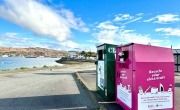Industry 'disappointed' with England's waste prevention plan

Members of the waste and resources industry have voiced 'disappointment' with the UK government's National Waste Prevention Programme for England.
Released today (11 December), the ‘Prevention is better than cure: The role of waste prevention in moving to a more resource efficient economy’ plan aims to:
- help businesses ‘understand and take advantage’ of the savings they can make by using resources efficiently and preventing waste;
- ‘make it easier’ for people to find out how to reduce their waste, and how to reuse items they no longer want; and
- help organisations and people ‘make the most’ of opportunities to save money by reducing waste.
However, many in the industry have voiced concern that there are no overall waste prevention targets in the plan, and that government appears to be stepping back from making any clear policy on how to deliver a circular economy, leaving it instead to stakeholders.
Lack of targets a 'missed opportunity'
Social enterprise Waste Watch said the plan was a 'missed opportunity' as 'whilst Defra has objectives, they have no figures or timescales'.
Tim Burns, Evidence and Policy Manager at Waste Watch said: "England is often quoted as leading the way on waste and resource issues in Europe, however we have seen this leadership rapidly erode since the coalition government took power.
"Whilst the waste hierarchy has been enshrined in UK law, England has neglected its duties to follow it. The publication of a waste prevention programme gave an opportunity for England to demonstrate commitment to more sustainable economy. Instead it chose to discard waste prevention and instead set England on course for greater waste generation."
Ray Georgeson, Chief Executive of the Resource Association, a trade association for the reprocessing and recycling industries and their supply chain, also voiced 'disappointment' at the lack of an overall target for waste prevention in England, adding that the Resource Assocation did not agree with government's view that "no single actor has responsibility or oversight”.
He said: "We believe that Government does have the leadership role here in ensuring that stakeholders with many interests are working to a clear strategy with clear targets and shared objectives. To say as the Government does (p20) that "as a principle, the Government considers that targets can have unexpected and undesirable consequences" seems to us to deny the responsibility Government has to lead, especially in challenging policy areas such as waste prevention.
"We agree that targets can have unexpected consequences but this is not sufficient reason to abandon them as a policy tool – more a reason to gather data correctly and monitor the effects of a policy and review if required. Our Waste Prevention Plan for England would have been richer if this approach had been taken.”
Georgeson did however commend the plan for "being underpinned by a strong rationale, evidence base and comprehensive and well researched compelling case for waste prevention"– and welcomed the 'intentions' on developing waste prevention metrics, work on design and innovation through the Technology Strategy Board, the new SEAP Sustainable Electricals Action Plan, and work to clarify the Definition of Waste in relation to reuse and repair activities – but said it was a "pity" that the plan doesn't "carry the strongest of signals and leadership position that an overarching target could have provided".
Jonathan Short, Deputy Chairman of plastics recycler ECO Plastics, also commented, saying: “The Government has already set challenging recycling targets, but mechanisms which are crucial to the delivery of those targets are still missing. Until we stop encouraging the export of recyclates ahead of domestic processing, until we introduce incentives to incorporate the use of recycled content in new products and until we have a mandatory code of practice for materials recycling facilities we won’t have the regulatory framework to underpin a truly circular economy. Today is a missed opportunity.”
'Waste industry needs to come to reuse sector'
Craig Anderson, Chief Executive Officer of the Furtniture Re-use Network took to Twitter to say: 'Disappointed and concerned by what I've heard about the English waste prevention programme this morning. Do it right or not at all', however, speaking to Resource, Anderson said that this stemmed from having "only [been] given a two page executive summary and a short explanation of what was in it [at the launch this morning]... I’d suggest that most of us left the room feeling it was up to the waste industry, manufacturers, retailers, civil society organisations and other practitioners to sort it all out."
Having read the full document, Anderson welcomed "the acknowledgment [the] sector receives as being the pioneer of reuse and certain other waste prevention activities, and also the encouragement and recognition given to the social and economic impacts of our work". He also applauded the initiative to bring together Local Authorities and the waste industry to develop reuse and prevention opportunities.
However, he added that he also worried about a lack of policy targets to bring about a change in waste practices to support reuse, and found 'most concerning' the 'continued espousing that the reuse sector needs to up its game and jump some more hurdles – it’s time the waste and recycling sector came to us'.
Concluding, Anderson said: "Yes, there are potential support mechanisms through some small funding pots allocated to communities and any future innovative waste prevention ideas, but it is our opinion that these have to be carefully managed and the risks to the reuse sector should be fully assessed. The funds are not that significant enough to make big improvements in waste prevention or reuse, but if used carelessly they could be detrimental to the sector and the market that already exists. Our sector has been centred around social purposes for 30 years and we see waste as the place where product should not be and as a resource to support consumers; we are not all driven by waste issues and if waste policy begins to change our sector’s position we will push back against this change.
"Our sector needs to save low income households £330million per year and provide a lot more economic benefit on top of that; so this cannot be hindered by light touch and explicit waste initiatives. It is implicit and understood by our sector and by those consumers who already donate and reuse product, that reuse matters for social and economic purposes not just waste avoidance."
'Wrong to criticise the Programme for containing no actions'
On a more positive note, the Environmental Services Association (ESA), 'cautiously welcomed' the plan, with Roy Hathaway, ESA Policy Advisor, saying: “There are a number of interesting ideas in the Waste Prevention Plan for England which should help promote waste prevention as part of the circular economy.
"The ESA welcomes the following: The Government’s commitment to helping the wider public sector to reduce its waste, starting with the NHS; the £5 million investment by TSB in designing out waste and the £1.5 million competition on design challenges for the Circular Economy; and the emphasis on reuse, including Defra bringing the waste management industry, local authorities and third sector together to improve reuse at HWRC’s.
“However, the devil will be in the detail and ESA members will want further clarification on a number of points, including: whether the Government’s proposals for improving access to finance for business will address the real obstacles to much-needed future investment; and how the Government intends to communicate its calls for action by businesses, local authorities, civil society and consumers in a way which makes the target audiences hear them and – crucially - act on them."
He added: “While there is much to applaud in today’s document, it remains to be seen whether Defra and WRAP have the political will and the resources to follow up all these ideas and help make them happen.”
The Chartered Institution of Wastes Management (CIWM) also tentatively welcomed the programme, with Chief Executive Steve Lee saying that it 'would be wrong to criticise the Programme for containing no actions, but there is little new there either'.
Welcoming the fact that the programme has been delivered within the EU deadline, and noting the 'significant amount of supporting information and the signal of leadership from government in tackling blockages to investment in more resource efficient business models', Lee added that 'without further work, it will not deliver the step change in society’s attitudes to resources and waste that is needed'.
He continued: “CIWM sounded alarm bells during the Summer consultation, particularly with regard to the rather distant role envisaged for government in this space, and most of those concerns remain. We wanted to see English Government adopt a leading role in Europe, working for common standards and exploring far-reaching resource efficiency measures including taxation, new product standards, and producer responsibility mechanisms. But we see none of this in the programme.
“We wanted common and appropriate data collection and the measurement of resource flows and impacts rather than counting recycled tonnes. We see a commitment to developing metrics by the end of next year and CIWM will commit to support in that vital work, but crucially there is still nothing on reduction targets or new approaches to measurement.
“We wanted clear leadership by government in terms of communications to provide strong overarching messages and underpin awareness raising activities by the wide range of partners involved in waste prevention. We see a nod in that direction but not much more. And we asked for clear signals on how waste prevention and its offspring – resource efficiency and security – will be co-ordinated between government departments and tied in to economic development and planning at a larger than local level. If we are to make proper headway in waste prevention rather than doing the minimum to satisfy Waste Framework Directive requirements, we will need to see action on all of the above."
Lee added that although 'many in the industry will be disappointed with this Waste Prevention Programme', he said that 'we must remember that waste prevention and resource efficiency are no less important for a lack-lustre national programme'.
Concluding, Lee said: "This industry, together with its new partners elsewhere in the resources cycle, needs to commit to working on the basics such as data gathering and analysis, as well as driving for early wins in areas such as re-use. This is a programme we hope will be refined and improved in the light of experience and new information, particularly from Wales and Scotland who have taken a more proactive and ambitious approach. It is time for us to learn and improve collectively rather than turning our backs because we don’t see everything we wanted in version 1.0.”






